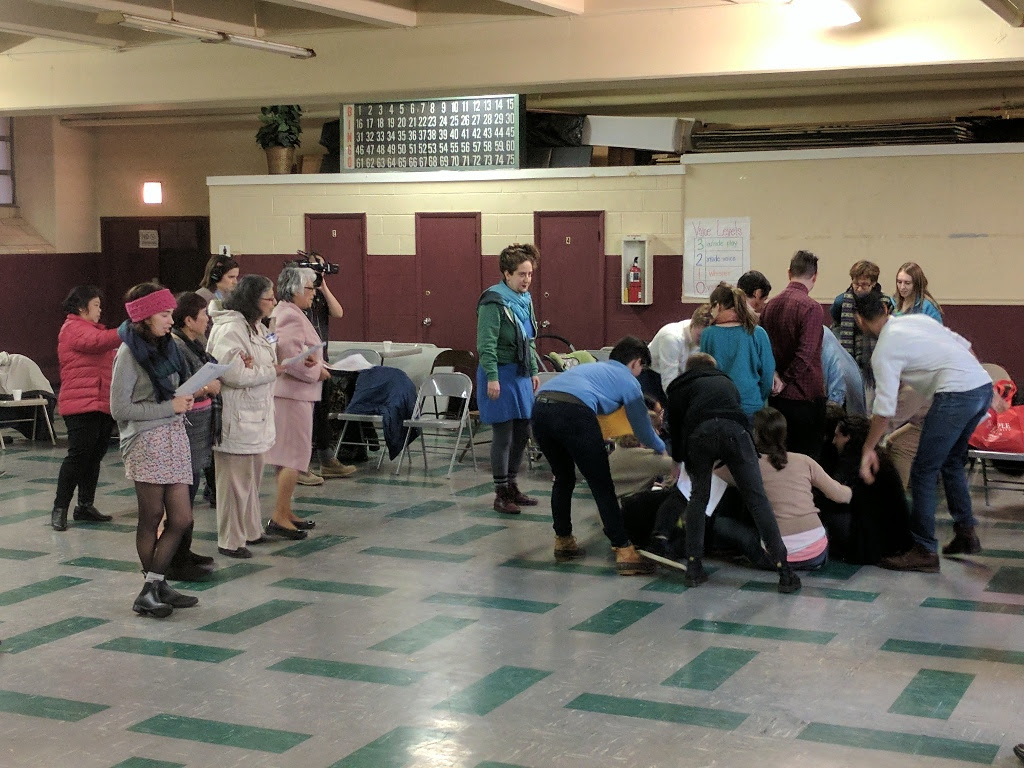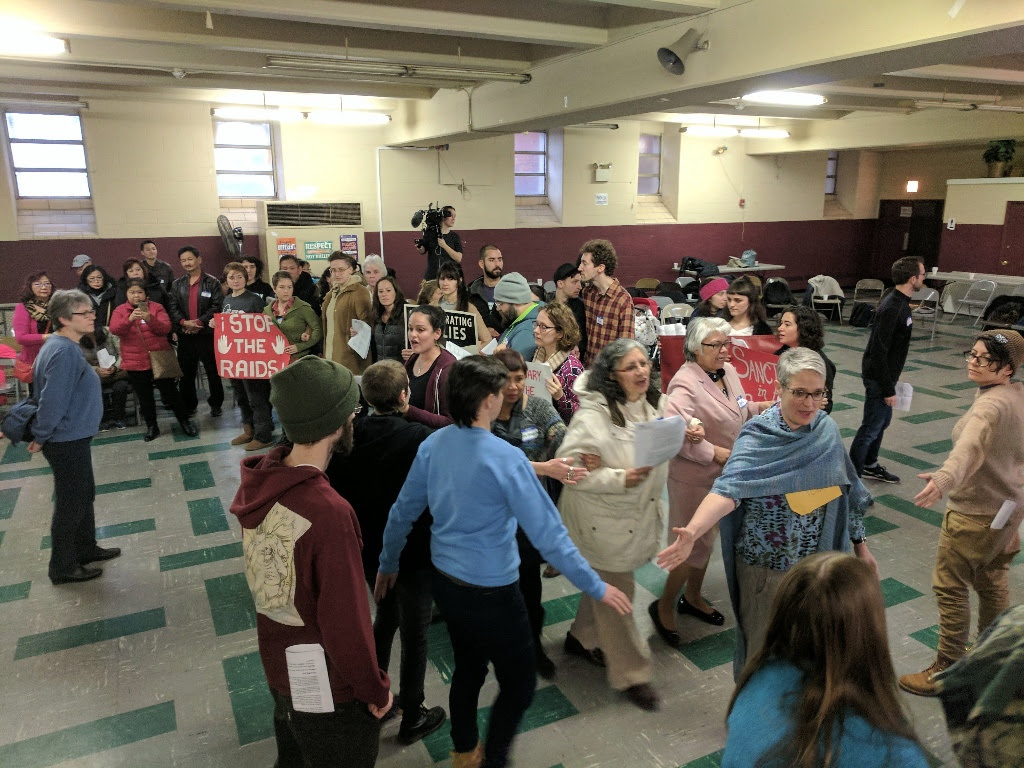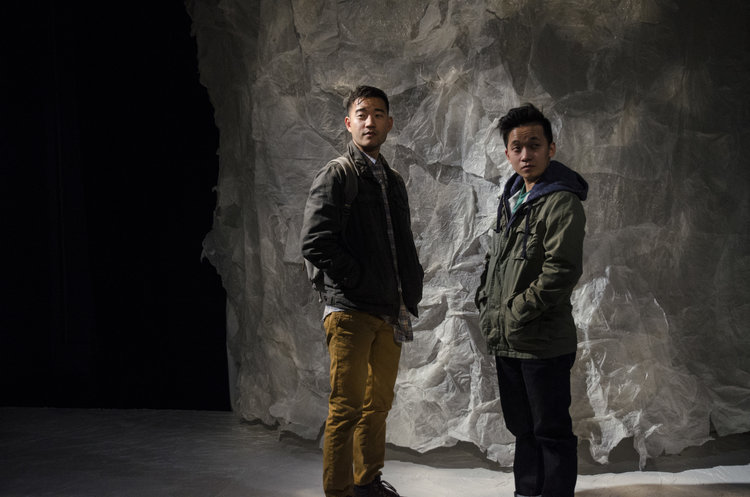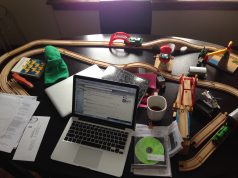
“Think about what kind of ICE agent you want to be. Are you the kind who is totally behind Trump or are you uncomfortable with the changes?” I look at my feet. I take a deep breath. I summon strength and authority. I have been cast in the role of an ICE (Immigration Customs Enforcement) Agent. I have been cast as a person who rips parents from children, who pounds on doors in the early hours of the morning, who takes people whether or not they are supposed to, who keeps them locked in detention centers, who assaults, tortures, intimidates and rapes, who chases hungry, dehydrated human beings to their death in the desert. And Trump just authorized hiring 10,000 more of them.
This may sound like a play or theater class, but it is not. I am playing this role at a training session for New Sanctuary Movement of Philadelphia. I am being trained to be part of a rapid response team who will rush to the site of any ICE raids at homes or businesses in Philadelphia and pray, sing, and sit-in to prevent deportation. In order to practice this, we are role-playing the scenario. And we are rotating so that everyone gets to play protestor, family, and ICE Agent. It is my turn as ICE.
I am stationed outside a huddle of chairs and people that we have assigned the “house,” or location of the immigration raid. My job is to block the entrance from the oncoming protestors. If any of them gets close to me I am supposed to let them know they are risking arrest.
As the role-play starts, I watch a daisy chain of arm-linked protestors approach me. Their eyes are determined and their voices raised in song. I notice myself thinking their prayer is beautiful and then I silence that thought. My job is to stand guard until I receive orders.

As the role-play goes on I have to arrest a member of the household. As I take her arm and carry her out of the house actors scream after me, “where are you taking her?” Protestors rush to surround me singing at the top of their lungs. I push through them and they move to surround us again. I raise my voice and push through. Again they block me with their bodies and their songs and again, I push through. Every time I feel nervous or discouraged I scan the room looking for a higher-up. Someone will tell me what to do. My job is simply to take orders.
While part of the ICE Agent role tears me up inside, a part of it feels frighteningly familiar. How many times have I shut off my empathy, my sense of truth or justice because of some kind of higher-up? How many times have I thought, if I do that I’ll lose my job, if I write that it’ll never get produced, if we do that no one will come to see it, if I say that others will be uncomfortable. While the job of an ICE Agent and a playwright seem nothing alike, the feeling inside was familiar. How many times have we in the theater forgone revolutionary programming, accessible ticket prices, transferring power to marginalized artists because of excuses that echoed my ICE Agent character: I’m following orders, my hands are tied, not my decision to make, I have a family to feed, I’m just trying to finish the workday and get home safe.

I can’t express the wave of release I felt when the trainer blew his whistle and I was allowed to drop character. As we debriefed we discussed the protesters’ tactics- how did they divide the ICE agents without escalating? How did they make it difficult for them to communicate through singing and chanting? Had any of this shaken our commitment to our jobs? Would it shake the commitment of a real ICE Agent?
When I trace the chain of command an ICE Agent follows to the top it ends with President Trump. When I trace the line of command I am following as a theater artist where does it lead? I certainly hope to a different place. We in the theater are as complicit as everyone else in this country. We have enabled the racism and misogyny that led us to this moment. We have participated in it and we have remained silent. Who have we been serving?
I thought about some of my ancestors who refused to follow orders in life or death situations. I thought about the ones who jumped from the train taking them to the concentration camp. I thought about the one who wrote protest papers against the czar and, according to family legend, had his fingers cut off and bled to death. I want to choose a line of command that honors them. I think of the lines from Toni Cade Bambara:
The task of the artist is determined always by the status and process and agenda of the community that it already serves. If you’re an artist who identifies with, who springs from, who is serviced by or drafted by a bourgeois capitalist class then that’s the kind of writing you do. Then your job is to maintain status quo, to celebrate exploitation or to guise it in some lovely, romantic way… As a cultural worker who belongs to an oppressed people my job is to make revolution irresistible.
I am taking orders from the ones who are filling the streets and the airports and the train station, from the ones staying up all night to write statements and songs, and to paint banners. I am taking orders from the hundreds of glittering queers dancing outside the republican meeting, from the Yemeni shop-owners on strike, from the teachers, students, and parents chanting outside the Senator’s home on the weekend.
I am taking orders from the ones like me, the ones living between genders every single day – in the streets, on the bus, in front of classrooms, behind podiums and behind bars; those of us who bend language to make space for ourselves, the ones who make a home in the invisible and in-between places. We always knew this system would never work for us. And our revolution is already irresistible.
“Irresistible Revolutions” is the second article in CdnTimes Volume 8, Edition 6: Letters to Canadians. Click HERE to read “New York Dispatch” by Tanya Marquardt, and check back on February 28, 2017 to read the final installment by SK Kerastas and Lisa Evans. Visit HowlRound.ca for its companion, Letters to Americans.









